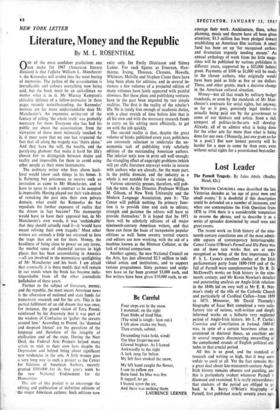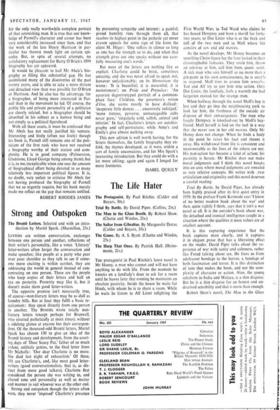Lost Leader
SIR WINSTON CHURCHILL once described the late Victorian decades as 'an age of great men and small events.' It is doubtful if this description could be defended on a number of instances, and when one contemplates the Irish Question from 1870 to 1916 there is a considerable temptation to reverse the phrase, and to describe it as a series of episodes dominated by small men and great events.
The recent work on Irish history of the nine- teenth century constitutes one of the most admir- able aspects of contemporary historiography. Conor Cruise O'Brien's Parnell and His Party was one of those rare works that are at once recognised as being of the first importance. Dr F. S. L. Lyons's excellent studies of the Irish parliamentary party from 1890-1910 and of the fall of Parnell were complemented by Dr R. D. McDowell's works on Irish history in the nine- teenth century; and Mr Kevin Nowlan's detailed and penetrating analysis on Anglo-Irish relations in the 1840s led on very well to Mr E. R. Nor- man's study of the role of the Catholic Church and particularly of Cardinal Cullen—from 1859 to 1873. Moreover, Mr David Thomely's biography of Isaac Butt completed a very satis- factory trio of serious, well-written and deeply informed works on a hitherto very neglected period of Anglo-Irish history. Mr L. P. Curtis's Coercion and Conciliation in Ireland, 1880-92 was, in spite of a certain heaviness often en- countered in doctoral theses, an excellent and in several respects disconcerting unravelling of the complicated strands of English political atti- tudes in that crucial period.
All this is so good, and the standard of research and writing so high, that it may seem unfair to cavil at all. Yet the fact remains that a great deal about late-nineteenth-century Anglo- Irish history remains obscure and puzzling, and this is particularly evident whenever Parnell is discussed and examined. It is really extraordinary that students of the period are obliged to go back to R. Barry O'Brien's biography of Parnell, first published nearly seventy years ago, for the only really worthwhile complete portrait of that astonishing man. It is true that our know- ledge of Pamell's character and career has been very considerably increased since then, and that the work of the late Henry Harrison in par- ticular has thrown much light on certain epi- sodes. But, in spite of several attempts, no satisfactory replacement for Barry O'Brien's 1899 biography has yet appeared.
It would be pleasant to hail Mr Abels's bio- graphy as filling this substantial gap. He has assimilated many of the discoveries of the past twenty years, and is able to take a more distant and detached view than was possible for O'Brien or Harrison. And he also has the advantage, for a biographer, of being more interested in Par- nell than in the movement he led. Of course, the public life and private personality of a politician are closely related, but a biographer should be absorbed in his subject as a human being and not simply as a political figurehead.
With all these assets, it must be confessed that Mr Abets has not really justified his venture. Interesting and lively (often too lively) though his book is, Parnell still remains one of the poli- ticians of the first rank who have not received a biography worthy of their stature and com- plexity. He is in good company (Palmerston, Gladstone, Lloyd George being among them), but it is, to me, inexplicable when one sees the amount of biographical effort being devoted to so many relatively less important political figures. It is, no doubt, very unfair to criticise Mr Abets for not having produced the biography of Parnell that we so urgently require, but his book merely made me reflect on the gap that remains unfilled.
ROBERT RHODES JAMES































 Previous page
Previous page